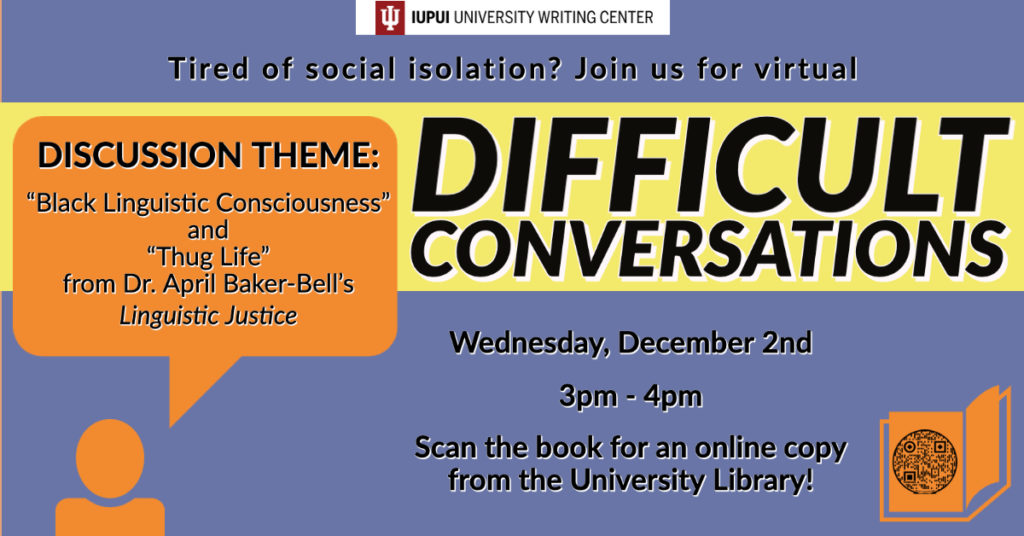By: Ethan M.
Our fantastic consultant Ethan explains our on-going series, Difficult Conversations, and why exactly we should all learn to become more comfortable with being uncomfortable.
If you’ve been checking up on the University Writing Center social media recently, you’ve undoubtedly seen the gorgeous flyers with quotes from April Baker-Bell’s book Linguistic Justice, urging you to come to the next Difficult Conversations event.
I’m sure many scrolled by and had the thought, “Well, what is Difficult Conversations?”
And that’s where we’ll start.
Difficult Conversations is a series of events hosted three times a semester by the Language and Cultural Diversity Across Campus committee. LCDAC is a group within the larger University Writing Center that focuses on hosting events and providing content for both our consultants and the students and faculty of IUPUI regarding diversity in literacy, language decolonization, multiple Englishes, and linguistic hierarchies.
Our intent (“our” because I’m lucky enough to be the coordinator of LCDAC) in putting on these events runs parallel with the overall goal of the committee; we want to get these ideas to the students and staff of IUPUI, and allow for discussion about such weighty issues in an open, comfortable environment. Of course, the “Difficult” of Difficult Conversations doesn’t imply that the actual talk will be laborious or awkward, in fact, the exact opposite is the case. These talks are always relaxed roundtable discussions about pressing topics, and every participant is invited to bring their own thoughts and experiences without judgement. Some of the topics of the past have been gender binaries, cancel culture, writing appropriation, and politics within writing centers.
The process of creating the event on our end (I’m lucky enough to be the coordinator of LCDAC right now) starts when two members of our committee choose a contemporary piece of writing about literacy, teaching practices, or other writing centers that both relates closely to the LCDAC’s overall goal and addresses issues that are pertinent to our current research in the University Writing Center.
Over the course of about three weeks, the two members of LCDAC work together to carefully read whatever piece or section of a piece they’ve chosen for their Difficult Conversations, pulling key quotes and formulating interesting discussion questions based on those quotes and the greater ideas in the piece. As I mentioned above, this semester we decided to cover April Baker-Bell’s Linguistic Justice, and we’ve divvied up those six chapters so that we cover two chapters per event. In the final week of preparation, the LCDAC pair creates a handout that includes those quotes and questions that stuck out most from the original text.
In the past, when it came time to actually put on the event, the pair running it would distribute their handout to guests and everyone would circle up in our Cavanaugh location to begin the talk. but now all we have to do is group up on Zoom through a link and the talk is on. Because we deal with tough topics like racism in education and how academic institutions can create oppressive hierarchies, we like to open with talking about the text at hand and asking some opening questions based on what’s been shared.
Being a guest at a Difficult Conversations is always really fun and engaging. Before I was even a part of LCDAC, when I was a consultant-in-training, I came to a few Difficult Conversations, and each time I did, the hosts did a great job of creating a welcoming atmosphere that made all participants totally comfortable with exploring issues significant to us both academically and personally.
Invariably, discussion of issues like academic hierarchies and racism in teaching leads to conversation that begins to transcend the original text. Posing open questions about the work will often prompt members of the audience to think about the ways that they’ve seen and relate to what we’re all talking about, and to me, those are the most rewarding times during the whole process of creating and hosting Difficult Conversations events. I love when the conversation moves from how the issue at hand impacts our academic environment to how we see it in our daily lives and in American culture at large.
At the end of each hour-long Difficult Conversations event, guests always come away having learned something new and have always attested to how well the more casual format works for getting into the difficult subjects that we do.
I hope this served as a useful guide for showing you a little bit about what Difficult Conversations is as an event and how we produce, and all of us LCDAC members look forward to seeing you at the next one!

CC: Tired of social isolation? Join us for virtual. DIFFICULT CONVERSATIONS. Discussion Theme: “Black Linguistic Consciousness” and “Thug Life” from Dr. April Baker-Bell’s Linguistic Justice. Wednesday, December 2nd. 3-4pm. Scan the book for an online copy from the University Library!
We hope to see you at our next Difficult Conversations, December 2nd, 2020!

